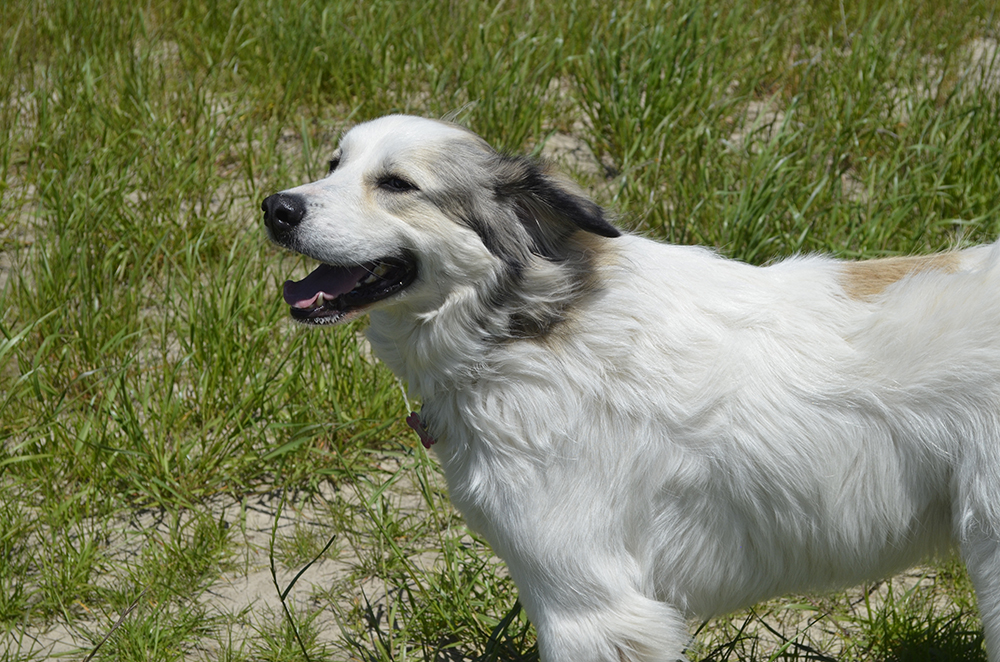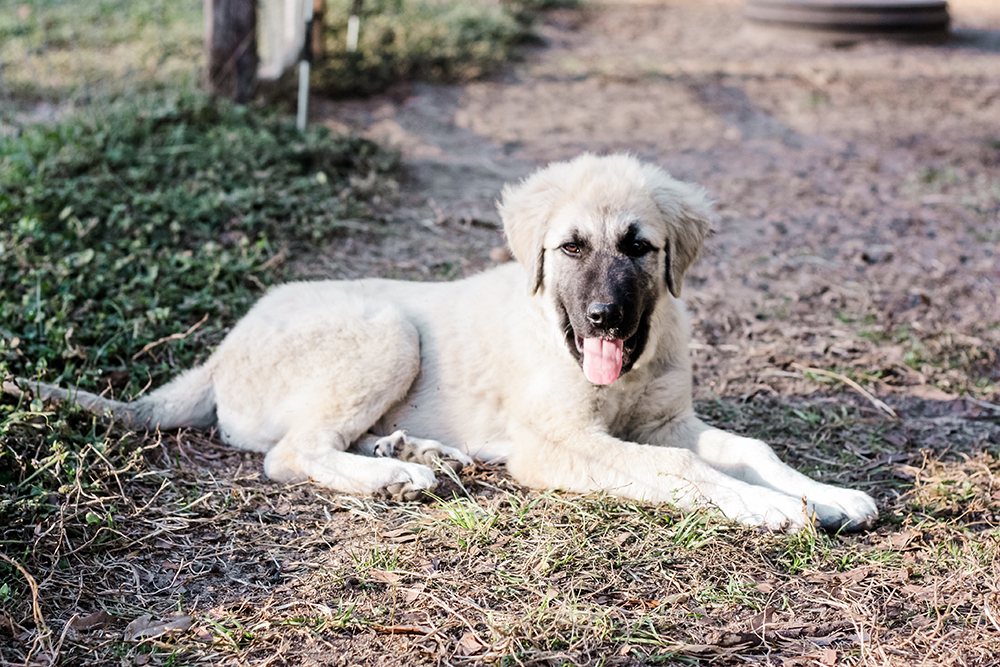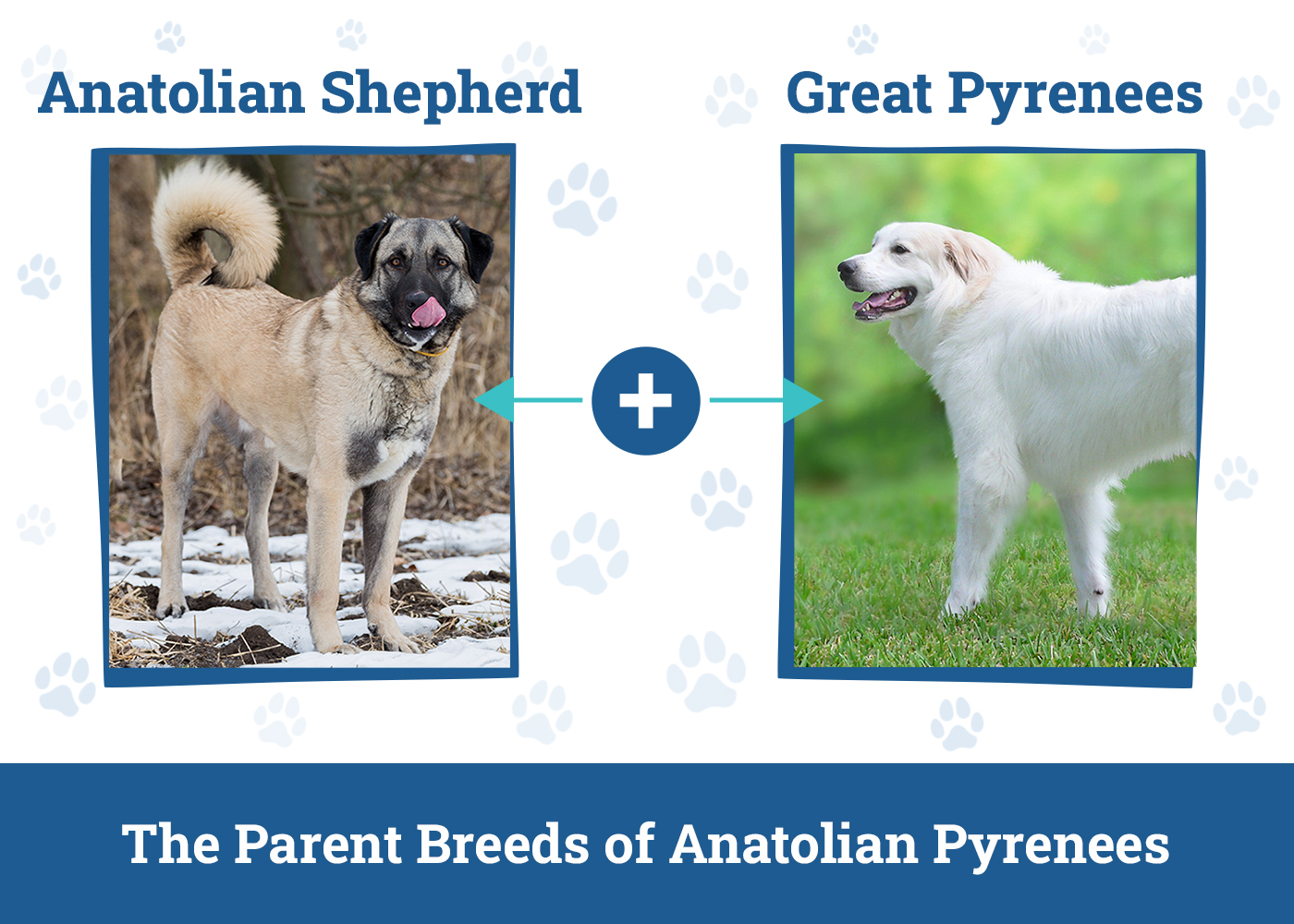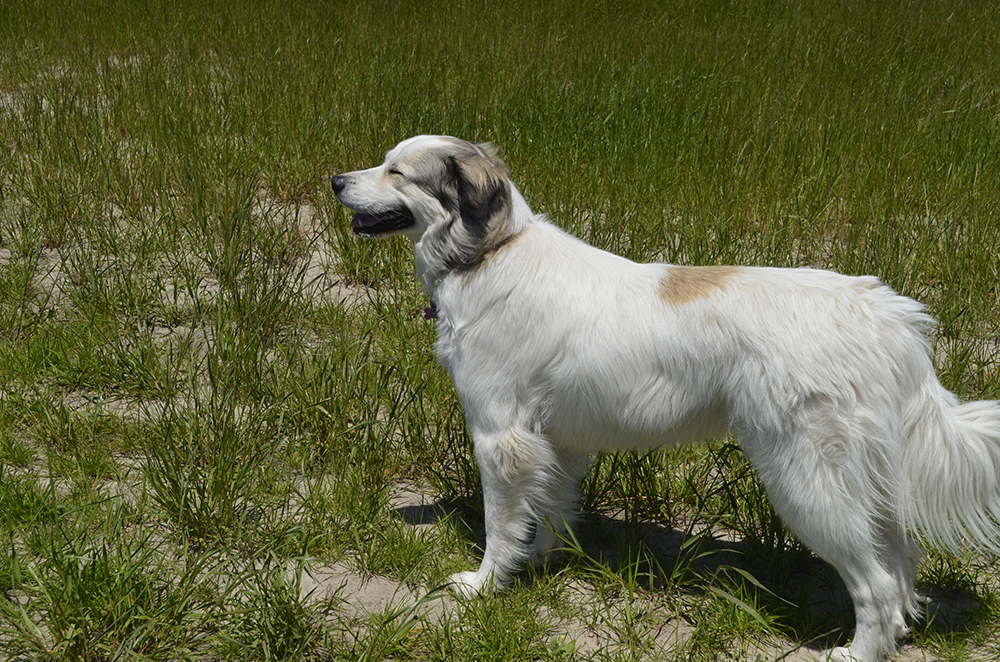
Click Below to Skip Ahead
When you take a hybrid breed of any sort, it is pretty much a gamble as to what you can expect from each puppy. However, when you take two powerhouse breeds like the Anatolian Shepherd and Great Pyrenees, you definitely get a very structurally and mentally similar dog.
In this article, we aim to explain what you can expect from training, personality, and overall care. This is certainly not the kind of breed for everyone, so make sure that you are completely compatible before committing to an animal of this size and stature.
Breed Overview
Colors:
White, brindle, blue fawn, red fawn, gray fawn, liver
Suitable for:
Rural living, farms
Temperament:
Protective, bold, intelligent, calm, mannerly
The Anatolian Shepherd is known for being hyper independent, vigilant, and alert. The Great Pyrenees is known for being gentler, but just as good of a guardian.
When you combine the two, you can bet your household will be protected at all costs. They are both extremely observant and capable dogs that can grow to well over 100 pounds. Let’s explore more about this hybrid combination.
Anatolian Pyrenees Characteristics
Anatolian Pyrenees Puppies

The Anatolian Pyrenees is a mixed breed of mass proportions. These dogs have extremely heavy, large bodies with dense coats. Even as puppies, they won’t stay little for long! You will have a giant traipsing around your house before you know it.
Anyone who’s interested in one of these puppies should understand the growth rate, so they know what to expect. With such a rapid grower, that means indoor messes will be more significant and harder to clean up.
Shedding should be completely expected! Getting your Anatolian Pyrenees used to being brushed early can make grooming a whole lot easier in the long run. An obedient puppy that will sit there calmly while you brush them will help to alleviate a lot of the issues associated with shedding.
Since these dogs are a mixed breed, there are no regulations on breeding from kennel clubs. While they are still magnificent pups, it could give backyard breeders and puppy mills leeway to make a profit—we want to avoid supporting these operations.
On top of it being difficult to genetically understand health conditions, other areas might be impacted too—such as unpredictable personality, tendencies towards destruction, and poor overall health.
It could be tempting to buy from a person who claims they had an accidental littler. Unless you know for sure that that’s the case, it can get a little messy. Instead of buying from a party that bred the animals on purpose, adopt from local rescues and shelters.
Anatolian Pyrenees Origin & History
The Anatolian Shepherd is from Anatolia, which is present-day Turkey. The breed originated about 2000 B.C. as a sheep dog. The Great Pyrenees, as the name implies, comes from the Pyrenees Mountains on the border of France and Spain, where they required thick, double coats to protect their bodies from harsh winters. The Great Pyrenees was bred as a livestock guard dog and first appeared in Europe between 1800 to 100 BC.
However, it is not clear when the Anatolian Pyrenees hybrid dog breed first came about. It could have come about from intentional breeding and the desire to create a farm dog that had characteristics of the Anatolian Shepherd and Great Pyrenees. Or, it could have just come from accidental breeding of two farm dogs.

Temperament & Intelligence of the Anatolian Pyrenees
This dog is certainly one that will be incredibly intelligent! They will impress you with their drive, brains, and capacity to learn. However, don’t think they won’t give you a run for your money. This particular breed combination is really best for experienced owners. If you don’t have a lot of training experience, you might find this hybrid to be a very challenging dog.
If they pull on a leash or do other physical things that are disobedient, you might find it incredibly difficult to manage or keep up with them. If they don’t have proper socialization and show any aggression, it’s also quite likely that you won’t have a lot of control.
If that’s the case, remember that professional training is always an option. This will help you home in on their intelligence and use it to your advantage. If they are well trained, they will make a wonderful dog.
Both of the parent breeds are guard dogs and explorers. They will much prefer a home with lots of land to any other type of situation. It can be hard to convince these dogs to stay inside. They want to be out defending the land and patrolling the yard.
Are These Dogs Good for Families? 👪
These dogs tend to be very social when they are properly introduced to a variety of people. One thing is for sure, even if they aren’t super crazy about strangers, they tend to be extremely loving, loyal, and devoted to their family units.
Because of the size, it could be challenging to have one of these dogs in a smaller living space, such as a condo, apartment, or city housing. These dogs are better suited for rural living by nature and love having room to roam and explore.
In fact, these dogs thrive best when they have a few acres or a large fenced-in backyard. They are guard dogs and will protect their territory.
Does This Breed Get Along With Other Pets? 🐶 😽
An Anatolian Pyrenees is going to be extremely protective by nature, which includes other household animals. They are guard dogs and have been used for many years to protect.
When raised alongside other animals, they will extend the same protective instinct to pets. If you have a farm, no matter the size, this can be a very good dog around to keep predators at bay.
Of course, like any other dog, these dogs do best when they are raised alongside other animals. Some of them might have preferences. As in, some of them might not like cats or won’t be able to be trusted around smaller caged animals.
So, supervision is always necessary, despite the dog’s temperament.
Things to Know When Owning an Anatolian Pyrenees
Food & Diet Requirements 🦴
This is the kind of dog that will eat you out of house and home. They are incredibly large, and they need a high calorie content per day to keep up with their demanding bodies. Since these dogs like to be on the go, they deplete quite a bit of energy in a day.
It’s best to make sure to portion it correctly, as weight can be problematic with this breed as well. Dry kibble and wet canned food are both viable options with this particular breed.
However, more and more pet parents are navigating towards fresh, raw, or homemade diets for their dogs due to greater nutritional quality. If you do so, it’s best to get the approval of your veterinarian to make sure you’re giving your dog a recipe that will keep up with their body’s demands.

Exercise 🐕
This particular dog will need plenty of exercise! On average, they will need about an hour of exercise per day. This is certainly an animal that loves to roam. So, it’s best to keep a watchful eye on them.
Having something such as an invisible fence, large fenced-in area, or other means of perimeter enclosure is essential. Make sure that it is tall enough to keep these large dogs from jumping over it.
Otherwise, they will want to wander around, meeting every new adventure with a wagging tail. However, that can get them into trouble, especially if you live somewhere where they can travel for miles into the great unknown.
Training 🎾
Training can be a challenge, especially considering the Anatolian roots. These dogs have been known to be a little bit headstrong and hard to convince. Because of their stubborn nature, inexperienced owners can find themselves having a little trouble.
Because of this dog’s size, it is very important that you have a firm training regimen with them. A dog of this stature will easily overpower you in situations that can be dangerous if they are not capable of listening to your commands.
If you find yourself in the situation, opting for professional training is crucial to the success of implementing mannerly behaviors. You can find professional trainers in your area with a quick internet search or by asking for recommendations from vets, friends, and other acquaintances.
Grooming ✂️
If you get one of these dogs, get your grooming products early, because you’re going to need them! Both the Anatolian Shepherd and the Great Pyrenees have double coats, meaning that they have thick, difficult to manage fur—and it will be everywhere!
If you have these types of dogs in the house, it is best to keep up with home cleaning and routine shedding. Have all of the grooming products, slicker brushes, bristle brushes, and shedding tools to keep your dog and your furniture shed free.
Health and Conditions ❤️
These dogs were bred to be extremely hardy and healthy. So, each one of these pups will bring something to the table. Because of the lack of regulations when it comes to breeding mixed dogs, it is hard to tell the health of either parent.
Since they can take on genetic abnormalities of either parent, it is important to understand what breeds are susceptible to what conditions and diseases. That way, you can know what to look for as they age to get ahead of any potential problems.
To stay ahead of it, it is important to get acclimated with your vet very early on. They can monitor their growth and health to get ahead of any potential issues that might pop up.
Minor Conditions
- Epilepsy
- Autoimmune thyroiditis
Serious Conditions
- Hip and elbow dysplasia
- Luxating patella
- Neurological disease
- Cancer
Male vs Female
The Anatolian Shepherd and Great Pyrenees are both extremely similar in size and structure. Because of that, it is very likely that the males will still outweigh the females and be broader and larger by nature. However, that is not always the case since this is a hybrid breed.
3 Little-Known Facts About the Anatolian Pyrenees
Both the Anatolian Shepherd and the Great Pyrenees were bred for the same reason, guarding and protecting livestock! That means, this is going to be an instinctual thing you won’t be able to train out of them. They were used to protect livestock from predators and will fiercely defend that position at all costs.
2. The Great Pyrenees is different from the Anatolian Shepherd temperamentally.
Anatolian Shepherds are well-known for being quite challenging dogs. Because of their independence and stubborn nature, they can create a lot more training struggles than other breeds. The Great Pyrenees, on the other hand, has a very laid back personality and can be much easier to work with.
When you combine these two dogs together, you will usually find that it falls somewhere in the middle. So, you should be prepared for either.
3. Puppies won’t look that different.
Because the Anatolian Shepherd and Great Pyrenees are so similar in appearance, it is going to be pretty predictable what the puppy should look like. They will generally have a light-colored coat, but how light the coat is can vary.
Final Thoughts
Now you know a little bit more about the Anatolian Pyrenees mixed breed dog. Keep in mind that this is a hybrid, which means that a litter was likely accidental. Since they are not AKC-registered or part of any kennel club, there are no breed standards.
If someone is breeding these dogs for profit, steer clear as they could be used for money or part of a puppy operation without concern for the health and wellbeing of the dogs. Make sure to do your research on each of the parent breeds to ensure that a mix of the two will be a perfect match for your family and your lifestyle.
Featured Image Credit: Rrajji, Shutterstock




